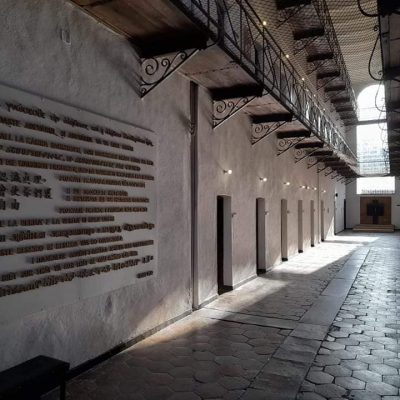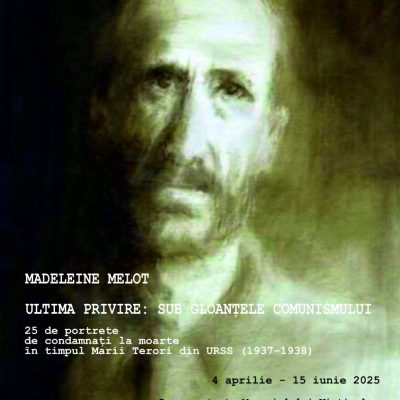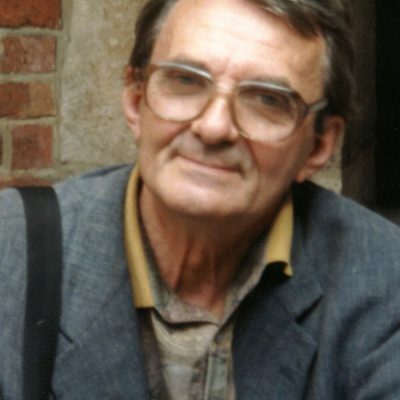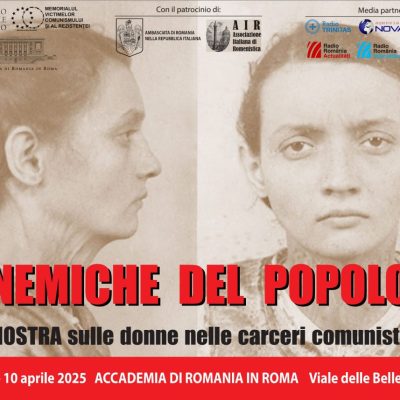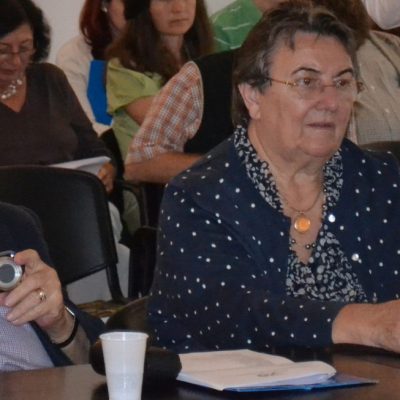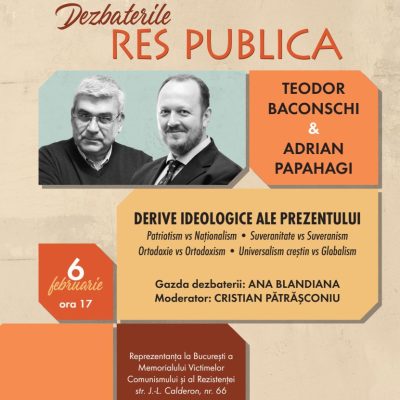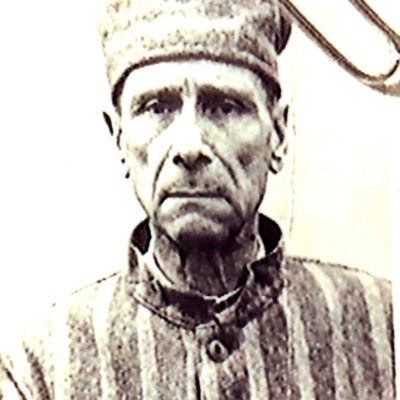Apel pentru un alt “Nürnberg”, apel pentru un veritabil proces al comunismului
Appeal for Nuremberg Trials for Communism
Cea de-a 30-a aniversare a căderii Zidului Berlinului ni se prezintă astăzi ca o valoroasă oportunitate. Nu trebuie să venim doar cu contribuția realmente necesară la memoria istorică, ci totodată trebuie să dezvoltăm și să susținem o cultură anti-totalitară, amplă, vastă și orientată către viitor.
Procesele de la Nürnberg, care au avut loc din 1945 până în 1946, au judecat și condamnat crimele național-socialismului și liderii săi, stabilind definitiv din punct de vedere judiciar, moral și politic opinia față de acea manifestare a totalitarismului. Procesele au demonstrat lumii că nazismul a fost malefic și distructiv față de oamenii săi, dar și că nu va mai fi vreodată acceptat nicăieri în lume. Comunismul, care pretutindeni a cauzat mai multe morți și mai multă suferință decât nazismul pentru o mult mai lungă perioadă de timp, nu a fost chemat niciodată să dea socoteală în fața unei instanțe internaționale precum cea de la Nürnberg.
Începând cu 1917, dictaturile comuniste sau socialiste au cauzat mai mult de 100 de milioane de decese în întreaga lume. Nu doar că sunt responsabili de răspândirea suprimării libertății individuale și incitarea clasei opozante, ci și pentru genocidul și crimele în masă, deloc evitate în cadrul regimului comunist. După cum bine știm cu toții, genocidul și masacrul sunt universal recunoscute ca fiind crime împotriva umanității.
Astăzi, în urma rezultatelor catastrofale ale așa-zisului “socialism real”, toate celelalte dictaturi care și-au avut rădăcinile în ideologia comunistă (în prezent în țări precum Venezuela sau Cuba ), atât evenimentele istorice cât și cele recente solicită o judecată finală similară – nu doar un verdict la adresa acțiunilor individuale, dar și o judecare morală a inevitabilelor rezultate ale acestei ideologii. Crimele comunismului împotriva umanității trebuie făcute cunoscute și pedepsite pretutindeni.
Comunismul nu a dispărut odată cu căderea Zidului Berlinului. Ideologia este încă prezentă în lume, în cadrul unor state și partide care sunt declarat comuniste, dar și în opinia politică si culturală care minimalizează și încearcă sa șteargă crimele acestuia, sugerând ca ar fi fost o decizie corectă care doar a coincis cu dezvoltarea acestui regim brutal după un altul, de-a lungul deceniilor și continentelor.
Ca ripostă împotriva acestor influențe cu tentă justificativă, stăruim asupra creării unor Procese de la Nürnberg pentru comunism, un proces mondial care să cerceteze amănunțit adevăratele crime ale acestei ideologii, să atribuie politic și instituțional responsabilitatea lor, să pedepsească degenerarea morală și să demonstreze tuturor cruzimea intrinsecă și incompatibilitatea cu societatea liberă.
Suntem foarte conștienți cu toții că un astfel de proiect va întâmpina dificultăți practice și limitări legislative. Chiar și așa, credem că astfel de piedici nu vor putea sta în calea unui proces politico-istoric, etic și cultural, pe care noi îl vedem ca pe o datorie față de umanitate insuflată asupra noastră de către conștiința istorică.
In numele milioanelor de oameni care au fost exterminați, și pentru a proteja viitoarele generații de o eventuală repetare, Procesele de la Nürnberg pentru comunism trebuie demarate cât mai curând posibil.
***
Joi, 7 noiembrie, Apelul pentru un Nürnberg al comunismului (documentul Bukovski-Cristin) a fost prezentat pentru dezbatere în Senatul Republicii Italiene de către Prof. Renato Cristin, Prof. Roberto de Mattei, Dr. Dario Fertilio, senatorul Adolfo Urso, senatorul Lucio Malan şi Vito Comencini.
Este o iniţiativă internaţională promovată de către Renato Cristin (Universitatea din Trieste, Italia), care susţine ideea fostului disident Vladimir Bukovski, recent plecat dintre noi, de a condamna irevocabil comunismul din punct de vedere istoric şi moral, aşa cum s-a întâmplat cu nazismul.
Apelul se bucură de o largă susţinere internaţională. Între cei 200 de semnatari senumără: Antonio Tajani (fost preşedinte şi membru actual al Parlamentului European, Italia), Prof. Stéphane Courtois (istoric, autor al Cărţii Negre a Comunismului, Franţa), Robert R. Reilly (director al Institutului Westminster, fost director al Vocii Americii, fost membru al Biroului Secretariatului de Apărare, SUA), Mart Laar (fost prim-ministru şi preşedinte al Colegiului de supraveghere al Băncii Estoniei), Erhard Busek ( fost vice-cancelar al Republicii Austria, Austria), Vladimir Kara-Murza (Preşedinte, Fundaţia pentru Libertate „Boris Nemtsov”, Russia).
Din România Apelul a fost semnat de Ana Blandiana, președintele Memorialului Victimelor Comunismului și al Rezistenței, Florian Mihalcea, președitenle Societății Timișoara, Rodica Coposu, președinte și Ion Andrei Gherasim, președinte exevutiv, Fundația Corneliu Coposu.
Apelul a fost lansat public în România luni, 11 noiembrie, în cadrul Galei Corneliu Coposu.
Apelul este susținut și de Platforma Memoriei şi Conştiinţei Europene, organizație internațională la care sunt afiliate 62 de instituții și organizații – printre care și Memorialul Sighet – din 19 țări, active în domeniul cercetării, documentării și educației privind regimurile totalitare din Europa secolului XX care a inișiat încă din 2014 proiectul Justiţia 2.0 – Justiţie Internaţională pentru Imprescriptibilitatea Crimelor Comunismului, al cărui scop este să sensibilizeze opinia internaţională în privinţa problemei nepedepsirii internaţionale a crimelor comunismului şi să contribuie la găsirea unor mijloace de a face dreptate la nivel mondial peste aceste crime etc.
Lista semnatarilor (7 noiembrie 2019)
Vladimir Bukovsky (Soviet dissident and author of Judgment in Moscow, UK)
Renato Cristin (University of Trieste, Italy)
Elizabeth Childs (president of the Ninth of November Press, USA)
Francisco José Contreras (University of Sevilla, Spain)
Alejandro Chafuen (International Freedom Educational Foundation, USA)
Vanessa Vallejo (director of PanAm Post, Colombia)
Evgeny Kissin (pianist, Russia-Britain-Israel)
Daniel Pipes (president of the Middle East Forum, USA)
Alberto Benegas Lynch (president of the Economics Section, National Academy of Sciences, Argentina)
Arkady Polishchuk (journalist and Soviet dissident, USA)
Mario Andretti (former Formula One racing driver, USA)
Bertil Haggman (Center for Research on Geopolitics, Sweden)
Ryszard Legutko (member of the European Parliament, Poland)
Dario Fertilio (president of Comitatus pro Libertatibus, Italy)
Mart Laar (former prime minister and chairman of the supervisory Board of the Bank of Estonia)
Łukasz Kamiński (former president of the Institute of National Remembrance, currently president of the Platform of European Memory and Conscience, Poland)
Alexandre Del Valle (essayst and professor of geopolitics, France)
Marco Marsilio (president of the Region Abruzzo, Italy)
Zoé Valdés (writer, Cuba-Spain)
Carlos Rodríguez Braun (Complutense University of Madrid, Spain)
Pedro Schwartz (University Camilo José Cela, Spain, and University of Buckingham, UK)
Janet Lynn (Five-time U.S. Ladies Figure Skating Champion, Olympic bronze, USA)
Daniel Lacalle (economist, Spain)
Stefano Zecchi (University of Milan, Italy)
David Satter (writer, USA)
Serge Assier (artistic photographer, France)
Richard Millet (writer, France)
Vladimir Kara-Murza (Chairman, Boris Nemtsov Foundation for Freedom, Russia)
Luis Pío Moa Rodríguez (historian and writer, Spain)
Jesús Huerta de Soto (University Carlos III, Madrid, Spain)
Antonio Martino (economist, former minister of Foreign Affairs and of Defense, Italy)
Jörg Baberowski (Humboldt University of Berlin, Germany)
Arturo Diaconale (director of the newspaper L’opinione, Italy)
María Schmidt (director of the Institute of the Twentieth Century, director of the House of Terror, Hungary)
Roberto de Mattei (former vice-president of the National Research Council and president of the Fondazione Lepanto, Italy)
Andrea Mancia (vice-director of the newspaper L’opinione, Italy)
Pedro Carmona Estanga (economist, former president of Venezuela)
Ricardo Puentes Melo (director of Periodistas sin Fronteras, Colombia)
Antonio Ramos Zúñiga (historian and writer, USA-Cuba)
Gabriel Zanotti (Austral University of Buenos Aires, Argentina)
Antonio Donno (University of Salento, Lecce, Italy)
Pamela Geller (editor-in-chief, The Geller Report, USA)
Nicola Procaccini (member of the European Parliament, Italy)
Chantal Delsol (Institut de France, Académie des Sciences Morales et Politiques, France)
Giuliana Iurlano (University of Salento, Lecce, Italy)
Erich Weede (University of Bonn, Germany)
Andrius Kubilius (former prime-minister of Lithuania, member of the European Parliament)
Hermann Tertsch (member of the European Parliament, Spain)
José Miguel Serrano Ruiz-Calderón (Universidad Complutense of Madrid, Spain)
Edgardo Zablotsky (Rector, University of CEMA, Buenos Aires, Argentina)
Stanley G. Payne (University of Wisconsin–Madison, USA)
Rasa Juknevičienė (former minister of Defense of Lithuania, member of the European Parliament, Lithuania)
Vera Lengsfeld (DDR-dissident, former member of the German Parliament, writer, Germany)
Žiga Turk (University of Ljubljana, former minister for Education, Science and Culture, Slovenia)
Jamie Glazov, (editor of Front Page magazine, USA)
Guélia Pevzner (journalist, France)
Emil Draitser (Hunter College, New York City, USA)
Richard Salomon (Retired U.S. Federal Law Enforcement Officer; National Security Consultant, USA)
Anne W. Carroll (executive director, Seton School, USA)
Theresa Hubbard (U.S. Military Officer (retired) and Political Activist, USA)
Thor Halvorssen (president, Human Rights Foundation, USA)
Maximilian Wolf Valerio (poet and writer, USA)
Marion Smith (executive director, Victims of Communism Memorial Foundation, USA)
Cliff Kincaid (director of the Center for Investigative Journalism Accuracy In Media (AIM), USA)
Pavel Stroilov (lawyer and author, United Kingdom)
Javier Barraycoa Martínez (Vice-Rector University Abad Oliba, Barcelona, Spain)
Rubén Manso Olivar (University of Alcalá de Henares, Spain)
Jacek Saryusz-Wolski (member of the European Parliament, Poland)
Stephen Hicks (Rockford University, Ill., USA)
Erhard Busek (former vice-chancellor of the Austrian Republic, Austria)
Paweł Ukielski (former deputy president of Institute of National Remembrance, currently deputy director of Warsaw Rising Museum, Poland)
Philip Boobbyer (University of Kent, UK)
Marcello Pera (former president of the Senate of the Italian Republic, Italy)
Carlos del Campo García Huidobro (Chilean Society for Defense of Tradition, Family and Property, Chile)
Justinas Žilinskas (Mikolas Romeris University of Vilnius, Lithuania)
Francesco Alberoni (sociologist, Italy)
Ferdinando Adornato (president of the Fondazione Liberal, Italy)
Gia Jandieri (vice-president and Founder of New Economic School, Georgia)
Vittorio Macioce (editor of the newspaper Il Giornale, Italy)
Jean Sévillia (journalist and historian, France)
Alejandra M. Salinas (Catlholic University of Argentina)
Martin Dewhirst (University of Glasgow, Scotland, UK)
Pierre-André Taguieff (historian of ideas, director of research at the CNRS, France)
Ana Blandiana (writer, president of the Memorial to the Victims of Communism from Sighet, Romania)
Michael Ledeen (Freedom Scholar at the Foundation for the Defense of Democracies, USA)
Eunie Smith (President Eagle Forum, USA)
Richard Perle (former Undersecretary of Defense, USA)
Benjamin Harnwell (director of the Dignitatis Humanae Institute, Italy)
Edward N. Luttwak (author, USA)
Peter Hoeres (Julius-Maximilian University, Würzburg, Germany)
Bertrand de Orleans e Bragança (Imperial Prince of Brasil)
Arnaud Imatz (historian and essayst, France)
Jean-Louis Harouel (University Paris II, France)
Gerd Habermann (Co-founder of the Friedrich von Hayek Society, University of Potsdam, Germany)
Corrado Sforza Fogliani (former President of Confedilizia, President of the Bank of Piacenza, President of the National Association of Popular Banks, Italy)
Carlos Alberto Montaner (writer and journalist, Cuba-Spain-USA)
Giulio Cainarca (journalist, director of Radio Padania, Italy)
Gerardo Bongiovanni (president of the Fundación Libertad, Argentina)
Ron Manners (Chairman of the Mannkal Economic Education Foundation, Australia)
Alan Charles Kors (Professor Emeritus of History, University of Pennsylvania, USA)
Lorenzo Montanari (Vice President, International Affairs and Strategies Americans for Tax Reform Foundation, USA)
Alvino-Mario Fantini (Editor-in-Chief, “The European Conservative” magazine, Austria)
Rodica Coposu (honorary president of Coposu Foundation, sister of Corneliu Coposu, prominent figure of the anti-communist resistance, Romania)
Ion-Andrei Gherasim (executive president of the Coposu Foundation, former member of the Romanian Parliament, Romania)
Maria Fernanda Cabal (senator of the Republic of Colombia)
Pablo Victoria (economist and historian, former senator of the Republic of Colombia)
Javier Silva Salas (writer, Chile)
Orlando Gutiérrez (founder of the Directorio Democrático Cubano, Cuba-USA)
Eduardo Palacios Maceira (MBA, former member of the Board of Banco Hipotecario del Uruguay)
D’Mar Córdoba (journalist, professor of Constitutional Law, Bogotá, Colombia)
Dimitrij Rupel (professor University of Ljubljana, first Slovenian minister of Foreign Affairs, Slovenia)
Jan Zobec (judge, former member of the Constitutional Court of Slovenia)
Jožef Jerošek (former member of the Slovenian Parliament, Slovenia)
Gilles-William Goldnadel (former president of the association France-Israel, founder and president of the pro-Israeli association Avocats sans frontières, France).
Steven Rosefielde (professor of Economics, University of North Carolina, member of the Russian Academy of Economic Science, USA)
Grégor Puppinck (director of European Centre for Law and Justice, Strasbourg, France)
Vasko Simoniti (historian and former minister of Culture of the Republic of Slovenia)
Janez Juhant (prof. emeritus, University of Ljubljana, Slovenia)
Janez Remškar (former director of the Ministry of Health, Slovenia)
Robert R. Reilly (director of the Westminster Institute, former director of The Voice of America, former member of the Office of The Secretary of Defense, USA)
Roger Kimball (editor and publisher of The New Criterion, president and publisher of Encounter Books, USA)
Stéphane Courtois (historian, author of the Black Book of Communism, France)
Antonio Tajani (former president and currently member of the European Parliament, Italy)
Cristina Cattaneo (psychologist and writer, Italy)
Giorgia Meloni (former minister and vice-president of the Italian Parliament, currently member of the Chamber of Deputies, president of the party Fratelli d’Italia, Italy)
Andrej Umek (University of Maribor, former minister of Education and Technology, Slovenia)
Adolfo Urso (president of the Foundation “Fare Futuro”, senator and vice-president of the Parliamentary Committee for the Security of the Republic, Italy)
Roderick Navarro (founder of the movement Rumbo Libertad, Venezuela)
Antonio Sánchez García (writer, historian, journalist, Venezuela)
Karen Caballero (journalist and anchorwoman, Cuba-Colombia)
Francesco Bigazzi (journalist and essayst, Italy)
Valery Buival (art historian, secretary of the Christian Conservative Party, Belarus)
Livio Caputo (journalist, Italy)
John Christmas (whistleblower against Parex Bank of Latvia, Latvia)
Aldo Forbice (journalist, Italy)
Alessandra Nucci (journalist and writer, Italy)
Carlo Scognamiglio Pasini (economist, former president of the Senate of the Italian
Republic, Italy)
Olena Ponomareva (University La Sapienza of Rome, Italy)
Adrian Ravier (director of the Economics Master of ESEADE University, Argentina)
Andrej Aplenc (former Yugoslavia-dissident, writer, Slovenia)
France Cukjati (former speaker of the Slovenian Parlament, Slovenia)
Julio Loredo de Izcue (president of the Association “Tradizione Famiglia Proprietà”, Italy)
Adriano Teso (entrepreneur, former member of the Italian Parliament, Italy)
Johannes Kaiser (journalist, director of the channel El Nacional-Libertario, Chile)
Agustín Laje (writer, director of the Centro de Estudios LIBRE, Argentina)
Luis Leonel León (writer and producer, Cuba-USA)
Hugo Vera Ojeda (president of ISSOS Foundation, Paraguay)
Nicolás Márquez (writer, journalist, internacional lecturer, Argentina)
Yoaxis Marcheco Suárez (Patmos Institute, USA-Cuba)
Mario Félix Lleonart Barroso (Patmos Institute, USA-Cuba)
Klas-Göran Karlsson (historian, Lund University, Sweden)
Federico Jorge Jiménez Losantos (journalist and essayst, president of the group Libertad Digital, Spain)
Juliana Geran Pilon (Senior Fellow at The Alexander Hamilton Institute for the Study of Western Civilization, USA)
Barbara Ledeen (activist, former director of Independent Women’s Forum, USA)
Iván Espinosa de los Monteros (member of the Spanish Parliament, Spajn)
Dušan Dostanić (Institute for Political Studies, Belgrade, Serbia)
Andreja Valič Zver (member of the Executive Board of the Platform of European Memory and Conscience, Slovenia)
Edwin J. Feulner (Founder and retired president of The Heritage Foundation)
Aleksandar Novaković (Institute for Political Studies, Belgrade, Serbia)
Roberto Cachanosky (economist and essayst, Argentina)
Aldo Rosao-Tuero (writer, journalist, director of the digital newspaper “El Nuevo Acción”, Cuba-USA)
Carl G. Holm (economist, chief editor of the Magazine Contra, Sweden)
Veselin Vukotic (leading founder and rector of University of Donja Gorica, academic at MASA and member of Mont Pelerin Society, Montenegro)
Petar Ivanovic (member of Parliament of Montenegro)
Zoran Djikanovic (president of Capital Markets Authority of Montenegro)
Bob McEwen (executive director of the Council for National Policy, USA)
Maja Drakic Grgur (dean of Faculty of international economics, finance and business at University of Donja Gorica, Montenegro)
Jadranka Kaludjerovic (director, Institute for strategic studies and prognosis, University of Donja Gorica, Montenegro)
Diana West (writer and essayst, USA)
Tim Wood (Olympic Silver Medalist and World Figure Skating Champion, USA)
Miloslav Samardžić (journalist and writer, Serbia)
Stefano Piazza (journalist and writer, Switzerland)
Pilar Gutiérrez (founder of Movimiento por España, Spain)
Malgorzata Wolczyk (journalist, Poland)
Lorenzo Fontana (former member of the European Parliament, former minister for Family and currently member of the Chamber of Deputies, Italy)
Luis Felipe Utrera-Molina (lawyer and essayst, Spain)
Giorgio Spaziani Testa (lawyer, president of “Confedilizia” – Building Property Confederation -, Italy)
Luigi Marco Bassani (University of Milan «La Statale», Italy)
Aldo Abram (economist, executive director of the Foundation Libertad y Progreso, Argentina)
Jerónimo Molina Cano (University of Murcia, Spain)
Francesco Borgonovo (chief editor of the newspaper «La Verità», Italy)
Philippe De Lara (University Paris 2, France)
Michael Yaroshevsky (Concordia University, Montreal, Canada)
Alexander von Sachsen (Prince of Saxony, Germany)
Roger R. Ream (president of The Fund for American Studies, USA)
Gerald Christian Nordskog (president of Nordskog Publishing, USA)
Lazar Fleishman (Stanford University, USA)
Antoine Arjakovsky (historian, Research director, Collège des Bernardins, Paris, France)
Wolfgang-Christian Fuchs (president of Inter-Asso (Internationale Assoziation ehemaliger politischer Gefangener und Opfer des Kommunismus), Germany)
Jonila Godole (executive director, Institute for Democracy, Media & Culture, Albania)
Robert Kostro (director, Polish History Museum, Poland)
Milos Suchma (president, Czech and Slovak Association of Canada)
Ronaldas Račinskas (executive director, Secretariat of the International Commission for the Evaluation of the Crimes of the Nazi and Soviet Occupation regimes in Lithuania)
Gjon Radovani (chairman of the Board, MEMO Center, Albania)
Florian Razvan-Mihalcea (president, Timisoara Society, Romania)
Peter Rendek (director, Centre for Documentation of Totalitarian Regimes, Czech Republic)
Vito Comencini (member of the Italian Chamber of Deputies, Italy)
Francesco Perfetti (LUISS University, Rome, Italy)
Paolo Sardos Albertini (president of the Association Lega Nazionale, Trieste, Italy)
Lucio Malan (member of Senate of the Italian Republic, Italy)
Fausto Biloslavo (journalist, war correspondent, newspaper Il Giornale, Italy)
Paolo Borchia (member of the European Parliament, Italy)
Dariusz Gawin (deputy director of Warsaw Rising Museum, Poland)
Dariusz Karłowicz (president of the St. Nicolas Foundation, editor in chief of the review Teologia Polityczna, Poland)
Sandra Vokk (member of Board of the Estonian Institute of Historical Memory, Estonia)
Christof T. Zellenberg (President of the Europa Institut, Wien, Austria)
Petr Blažek (historian, Centre for Documentation of Totalitarian Regimes, Czech Republic)
Marek Mutor (director of the Remembrance and Future Institute, Wrocław, Poland)
Pavel Žáček (historian, Member of the Czech Parliament, Czech Republic)
Ivonka Survilla (President of the Rada of the Belarusian Democratic Republic, Belarus/Canada)
Viachaslau Bortnik (Belarusian American human rights defender, Secretary of the Rada of the Belarusian Democratic Republic, Belarus/United States)
Tanja Nyberg (President of the Magnitsky Act Initiative, Russia)
Johann Grünbauer (president of the Foundation History of Totalitarian Regimes and their Victims, Nederland)
Jaak Madison (member of the European Parliament, Estonia)
Jarosław Szarek (president of the Institute of National Remenbrance, Poland)


